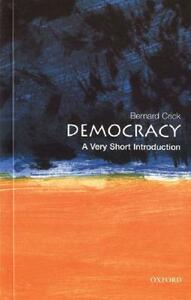Take a photo of a barcode or cover
This one's a bit hard to rate, because, um, I didn't actually understand all of it. It was a nice introduction to democracy, but possibly a little bit too in-depth for me, especially since I have never actually liked history.
“The populist mode of democracy is a politics of arousal more than of reason, but also a politics of diversion from serious concerns that need settling in either a liberal democratic or civic republican manner.”
Hard to tell if this one was inaccessible or just unclear. Most of the VSIs state a definition up front for what something is, but instead, Bernard muses about the difficulty of pinning democracy down like that. "Demokratia, an Athenian minor deity - she is everybody's mistress and yet somehow retains her magic, even when a lover sees that her favors are being, in his light, elicitly shared by many another." I can respect this (heck, its why I came to the book in the first place!) but I would've appreciated a greater attempt.
After this, he races through democracy's roots in Ancient Greece. I felt frustrated by the pace, but I guess I can forgive it provided this is a "very short introduction" and he had a lot of ground to cover.
After Greece, he admittedly loses me for quite awhile and then spends an entire, long chapter on Alexis De Tocqueville. I'd never heard of him, but I suppose his work, Democracy in America was quite important. Important enough to take up an entire chapter in a short book? Not sure.
Bernard regained me when speaking about how certain systems relate to or within a democracy, like meritocracy, autocracy, and populism.
All in all, this VSI just wasn't the most helpful.
Hard to tell if this one was inaccessible or just unclear. Most of the VSIs state a definition up front for what something is, but instead, Bernard muses about the difficulty of pinning democracy down like that. "Demokratia, an Athenian minor deity - she is everybody's mistress and yet somehow retains her magic, even when a lover sees that her favors are being, in his light, elicitly shared by many another." I can respect this (heck, its why I came to the book in the first place!) but I would've appreciated a greater attempt.
After this, he races through democracy's roots in Ancient Greece. I felt frustrated by the pace, but I guess I can forgive it provided this is a "very short introduction" and he had a lot of ground to cover.
After Greece, he admittedly loses me for quite awhile and then spends an entire, long chapter on Alexis De Tocqueville. I'd never heard of him, but I suppose his work, Democracy in America was quite important. Important enough to take up an entire chapter in a short book? Not sure.
Bernard regained me when speaking about how certain systems relate to or within a democracy, like meritocracy, autocracy, and populism.
All in all, this VSI just wasn't the most helpful.
challenging
informative
medium-paced
A very engaging and thought provoking book, perfect for those who are just beginning to dip their toes into the world of politics. While this book may be small, it covers a very diverse range of topics related to democracy, both in a historical context and in a modern sense, and it invites you to think about these topics and how they relate to and affect your life.
The author does a very good job at explaining his ideas in a simple and uncomplicated yet engaging manner.
While I found the final two chapters the most interesting, the rest of the book was also gave me lots to think about. This historical evolution of democracy as a concept was especially interesting to me.
All in all, a good place to start. Enough detail and examples that you understand the points being made, but not so much that you get lost in it. Clear and engaging.
The author does a very good job at explaining his ideas in a simple and uncomplicated yet engaging manner.
While I found the final two chapters the most interesting, the rest of the book was also gave me lots to think about. This historical evolution of democracy as a concept was especially interesting to me.
All in all, a good place to start. Enough detail and examples that you understand the points being made, but not so much that you get lost in it. Clear and engaging.
good intro if u want the most neo-liberal ass review of what democracy is and was. the man argues against the boring "civics" style engagement with democracy and politics more generally, but then proceeds to give an incredibly abstracted and reductive view of democracy which bored me all to hell. And that ON TOP of erasing countless democratic societies and movements from across the globe. The man quotes fucking Hayek and then never quotes Malcolm X or Che. Ridiculous, Imo.
reflective
slow-paced
A brief but dense writing on the meaning, the history and the effectiveness of democracy across history.
Crick, is a 20th century, British, political theorist who was viewed as a democratic socialist.
Beginning w/ the Greeks, Crick traces the evolution of democratic structures, examining European examples of republicanism, democracy, populism in historic context, ending with a discussion of democratic citizenship and a hope for the future.
Crick, is a 20th century, British, political theorist who was viewed as a democratic socialist.
Beginning w/ the Greeks, Crick traces the evolution of democratic structures, examining European examples of republicanism, democracy, populism in historic context, ending with a discussion of democratic citizenship and a hope for the future.
‘Man’s inclination to justice makes democracy possible; but man’s capacity for injustice makes it necessary.’
This type of essay will argue that there is no single meaning of democracy since there are many types of democracy, which often have their own opinions about the term's meaning. Such direct democracy can be seen as government by the people. In contrast, representative democracy can see because the government leads the people.
Furthermore, depending on whether someone respects the same political rights will change their description. For example, when a person has a high level of social relevance, they would believe that democracy can be the rule in the elite and political equality does not exist—a point of observation of the Marxists.
On the other hand, however, liberal democracies believe this, and therefore their view of "democracy" is political equality. As Bernard Crick stated 93 inches in democracy is the most promiscuous word in public affairs" (Andrew Heywood), which means that the word democracy can mean anything. The word democracy comes from the Greek expression demo, which means people and kratos meaning power.
Therefore, the classic term for democracy is the regulation of the people. However, that term is too vague, which may be the people of ancient Greece to get involved in politics: you had to be a man over twenty, excluding slaves and foreigners. On contemporary occasions, there is limited political involvement, usually from twenty-one to fifteen to vote. As a result, it shows that not everyone can control their federal government due to the times.
The fact that the vote based on the majority demonstrates that the option represents just almost everyone. Therefore, the people who voted against the majority do not manifest "the cruelty of the majority" (Andrew Heywood, again) clarifies that the term people cannot be everyone who lives in the state, but the vast majority. So, based on how old you are and who you voted for, it will depend on whether you believe the word democracy governed by the people.
The most important point of democracy is the liberal democrat's vision of equal political rights "one person, one vote, one value", this is true. Most traditional Western democratic routines based on voting where everyone gets a vote; indeed, it is the same. In contrast, Marxists believe that this is not the case. The more pattern of the significance of social equality, such as demand for mass communication and financial resources and voting, will likely have its perspective taken into account by the government.
The fact is that George W. Bush had the support of the mass media, like Fox Press, and people in power like Jeb, planned to get him to come to electricity. (George W Bush gained control of the mass media, do not hear the middle voice of voters as Al Gore was most of the best interpreters). Have society, the capacity of organized groups to articulate the government's ability to respond.
In conclusion, the Chinese of democracy used since political promotion "is just a political tool that is designed and produced to cover political intent" (Andrew Heywood, page 2 of political theory). What Andrew meant is just like Bernard Crick because there is no clear definition of democracy. Everything is determined by who is someone or a group that is understanding the word democracy.
If you live in a representative democracy under a totalitarian regime and you are the head of the ruling party, then you would say that it is democratic working in the people's best interests, even though they could be living in the gutter starving. Perhaps if you are the prime minister of Great Britain, although the people indirectly elected you to end up being prime minister, you are not creating a government for the people. You would say you are democratic, in contrast with people who didn't choose you or your plan.
If you are considered a Marxist, your opinion of liberal democracy is that it is false because personal equality would not exist. The elite and corporatists have more power to affect government for them and generally not for the majority. If you are the first-rate, I would say it is democratic because we are in a competitive capitalist environment. Through associations at a glance, we all benefit the economy because we now have the know-how, and most want it. >
Direct democracy is another definition of democracy, stating that citizens must have complete control. However, due to political constraints such as the era and the ability to reject referendums, it cannot fully realize the government by the people.
Source: https://mystudybay.com.br/blog/como-voce-definiria-a-palavra-democracia/
Furthermore, depending on whether someone respects the same political rights will change their description. For example, when a person has a high level of social relevance, they would believe that democracy can be the rule in the elite and political equality does not exist—a point of observation of the Marxists.
On the other hand, however, liberal democracies believe this, and therefore their view of "democracy" is political equality. As Bernard Crick stated 93 inches in democracy is the most promiscuous word in public affairs" (Andrew Heywood), which means that the word democracy can mean anything. The word democracy comes from the Greek expression demo, which means people and kratos meaning power.
Therefore, the classic term for democracy is the regulation of the people. However, that term is too vague, which may be the people of ancient Greece to get involved in politics: you had to be a man over twenty, excluding slaves and foreigners. On contemporary occasions, there is limited political involvement, usually from twenty-one to fifteen to vote. As a result, it shows that not everyone can control their federal government due to the times.
The fact that the vote based on the majority demonstrates that the option represents just almost everyone. Therefore, the people who voted against the majority do not manifest "the cruelty of the majority" (Andrew Heywood, again) clarifies that the term people cannot be everyone who lives in the state, but the vast majority. So, based on how old you are and who you voted for, it will depend on whether you believe the word democracy governed by the people.
The most important point of democracy is the liberal democrat's vision of equal political rights "one person, one vote, one value", this is true. Most traditional Western democratic routines based on voting where everyone gets a vote; indeed, it is the same. In contrast, Marxists believe that this is not the case. The more pattern of the significance of social equality, such as demand for mass communication and financial resources and voting, will likely have its perspective taken into account by the government.
The fact is that George W. Bush had the support of the mass media, like Fox Press, and people in power like Jeb, planned to get him to come to electricity. (George W Bush gained control of the mass media, do not hear the middle voice of voters as Al Gore was most of the best interpreters). Have society, the capacity of organized groups to articulate the government's ability to respond.
In conclusion, the Chinese of democracy used since political promotion "is just a political tool that is designed and produced to cover political intent" (Andrew Heywood, page 2 of political theory). What Andrew meant is just like Bernard Crick because there is no clear definition of democracy. Everything is determined by who is someone or a group that is understanding the word democracy.
If you live in a representative democracy under a totalitarian regime and you are the head of the ruling party, then you would say that it is democratic working in the people's best interests, even though they could be living in the gutter starving. Perhaps if you are the prime minister of Great Britain, although the people indirectly elected you to end up being prime minister, you are not creating a government for the people. You would say you are democratic, in contrast with people who didn't choose you or your plan.
If you are considered a Marxist, your opinion of liberal democracy is that it is false because personal equality would not exist. The elite and corporatists have more power to affect government for them and generally not for the majority. If you are the first-rate, I would say it is democratic because we are in a competitive capitalist environment. Through associations at a glance, we all benefit the economy because we now have the know-how, and most want it. >
Direct democracy is another definition of democracy, stating that citizens must have complete control. However, due to political constraints such as the era and the ability to reject referendums, it cannot fully realize the government by the people.
Source: https://mystudybay.com.br/blog/como-voce-definiria-a-palavra-democracia/
reflective
slow-paced
This short book (or long article) was more focused on American and British perspectives, apart from the historical Roman context. However, I felt it completely misses the world's largest democracy and the mechanisms here, which of course, is based on British parliamentary system. Also missing are the details on democratic experiments around EU, UN etc.
Where the book shines is in knowing the difference between democracy as it was envisioned as well as the literary meaning of the word and how it is used and misused today to mean multiple things for multiple people. This part was eye opening for me personally.
Now, I am curious to know other books that cover democracy in more detail.
Where the book shines is in knowing the difference between democracy as it was envisioned as well as the literary meaning of the word and how it is used and misused today to mean multiple things for multiple people. This part was eye opening for me personally.
Now, I am curious to know other books that cover democracy in more detail.





